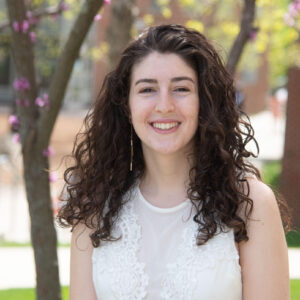Growing up, my school brought in Holocaust survivors to speak with students each year, including pairing with the organization “Names, Not Numbers.” In their yearly Yom HaShoah talks, survivors never failed to mention the dehumanizing numbers branded on their arms. That image of turning people into numbers and that defiant slogan, “names, not numbers,” resounded throughout my entire childhood. Last year, when I was first introduced to the Gazan website “We Are Not Numbers,” it immediately struck a chord. Tens of thousands of Gazans have been killed by the Israeli military over the past year and a half, and despite the documentation and dehumanization of these individuals as mere data points, we have access to their names, to lists and lists and lists of names so long it’s easy to blur them together. But just as no Holocaust survivor or victim should ever be reduced to a statistic, every Gazan is a person with a story.
This year, with YomHashoah just passed, it remains critical that the world sees that opposing the genocide in Gaza is crucial to upholding the remembrance of the Holocaust. That’s why I and other Jerusalem based activists created a set of posters honoring Palestinians killed by Israeli aggression over the past eighteen months. In reference to the idea that every person is a name, not a number, the English version of the poster reads “Names, Not Numbers,” and the Hebrew reads, “לכל איש.ה יש שם,” every person has a name. For us, displaying the humanity of each victim was only the beginning.
In another set of posters, we took horrific images that have come out of Gaza over the past year, and matched them with the slogans heard over and over again from defenders of Israel’s actions over the past eighteen months. “We were just following orders” captions a photo of a truck full of naked and bound Palestinians captured by Israel; “We didn’t know” accompanies an image of an emaciated child that echoes images of Auschwitz survivors. “Just following orders” – a photo of an Israeli map saying that all Palestinians must clear out of yet another area or they will be shot as terrorists on sight, a line of thousands of people fleeing, an entire city razed. “We didn’t know” – a soldier posing with a human skull and posting it on social media, starving children holding out empty pots.
Reactions to this work may be polarizing. But as an organizer, I don’t feel that we cheapened the memorialization of this great trauma by using words and phrases synonymous with the Holocaust. In fact, we should all be concerned that these phrases are now common parlance about the Gaza war, that these chillingly evocative photos are real images from Gaza. Juxtaposing them with this somber day in the Jewish calendar held up a mirror to our community, helping us see what we are on the verge of becoming. Holocaust survivor Raphael Lemkin fought for genocide to become a legal crime so that it could be “identifiable, obvious and abhorrent.” What fits that description more than a parallel you never wanted to make – but can’t help but see? I didn’t want to be talking about Gaza on Yom HaShoah. I would have preferred not to see forced displacement and mass starvation and calls for liquidating a population this Yom HaShoah. I want to say that it could never happen again. But when even Holocaust survivors are calling out these parallels, it’s impossible to stay silent.
It isn’t just in regard to Gaza that the memory of the Holocaust feels eerily relevant this year. In East Jerusalem, Israeli police have decided that children’s books are incitement to terrorism. In the United States, legal residents can be disappeared by the Trump Administration to concentration camps in other countries. I often hear from my community members, “Well, I’m safe, because…” and can’t help but remember the prescient poem by Pastor Martin Niemöller, “First they came.” We must be willing to see the signs, learn from history, and not refrain from fighting back until we are the ones held at gunpoint.
Critics will call Jews like myself and my fellow organizers antisemites and Holocaust deniers. But, as Jews from Israel and the Diaspora, with a treasure trove of family tales of displacement and repression, it’s just the opposite. We know what this is. We’ve seen it before. This is not an attempt to compare or contrast tragedies. We aren’t drawing equivalencies or insisting that these things are exactly the same. If you think we’re misunderstanding the Holocaust, you’re misunderstanding the crucial message. The Holocaust is very, very real to us — that’s why our alarm bells are ringing.
Some would have us memorialize the Holocaust by freezing ourselves in that moment in time. That mode of thought holds that the Jewish people are always the victims. Therefore, anything we do is justifiable in the name of self defense. But those of us who see every Gazan as a name and a story know it’s the opposite. Keeping Holocaust memory alive means recognizing crimes against humanity and opposing them with all our might. Never again is now, for all of us.

